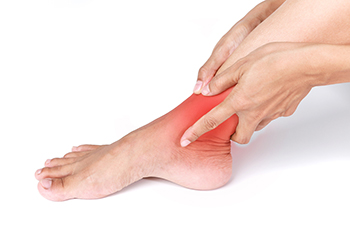Connect With Us
Blog
Do I Have Flat Feet?

The medical term for fallen arches or flat feet is known as pes planus. It is noticeable when the foot lies flat on the floor, and the arch is absent. Some patients do not have symptoms, or may experience mild pain or achiness in different parts of the leg. Most people are born with flat feet, and the arch generally forms in the teenage years. This condition may develop from genetic reasons, obesity, or possibly from a foot injury. Additionally, a dysfunction of one or more of the muscles in the foot may lead to flat feet. It is beneficial for patients who have flat feet to wear shoes that are supportive, and this may help to prevent future injuries. People who have flat feet are advised to consult with a podiatrist who can offer custom-made orthotics for relief.
Flatfoot is a condition many people suffer from. If you have flat feet, contact one of our podiatrists from Foot & Ankle Associates of Maine. Our doctors will treat your foot and ankle needs.
What Are Flat Feet?
Flatfoot is a condition in which the arch of the foot is depressed and the sole of the foot is almost completely in contact with the ground. About 20-30% of the population generally has flat feet because their arches never formed during growth.
Conditions & Problems:
Having flat feet makes it difficult to run or walk because of the stress placed on the ankles.
Alignment – The general alignment of your legs can be disrupted, because the ankles move inward which can cause major discomfort.
Knees – If you have complications with your knees, flat feet can be a contributor to arthritis in that area.
Symptoms
- Pain around the heel or arch area
- Trouble standing on the tip toe
- Swelling around the inside of the ankle
- Flat look to one or both feet
- Having your shoes feel uneven when worn
Treatment
If you are experiencing pain and stress on the foot you may weaken the posterior tibial tendon, which runs around the inside of the ankle.
If you have any questions please feel free to contact our office located in Brunswick, ME . We offer the newest diagnostic and treatment technologies for all your foot and ankle needs.
Why Your Ankle May Hurt Without an Injury

Ankle pain that is sudden, and not due to an injury, may be caused by any number of causes, including certain arthritic conditions. Rheumatoid arthritis and osteoarthritis can sometimes negatively affect the tissue and cartilage (respectively) in ankles, causing pain and swelling. Similar symptoms can be present when reactive arthritis affects the ankle. This is a condition which is triggered by a bacterial infection elsewhere in the body. Gout is another type of arthritis in which excessive amounts of uric acid crystalize on joints. Gout usually affects the big toe, but it can also affect the ankle. Another disease that sometimes affects the ankle joint causing stiffness, pain and swelling is scleroderma. Bursitis is a condition in which the cushioning bursa sac at the back of the ankle becomes inflamed from stress or overuse and produces pain and inflammation. If you rupture or tear the tendon that connects your calf muscle with your heel (Achilles tendon), you can develop a condition known as Achilles tendonitis. These are just a few of the conditions that may cause ankle pain without injury. Whatever the cause, it is important to have your ankle pain properly diagnosed in order to receive the proper treatment. Call a podiatrist if you are experiencing any pain in your ankle.
Ankle pain can be caused by a number of problems and may be potentially serious. If you have ankle pain, consult with one of our podiatrists from Foot & Ankle Associates of Maine. Our doctors will assess your condition and provide you with quality foot and ankle treatment.
Ankle pain is any condition that causes pain in the ankle. Due to the fact that the ankle consists of tendons, muscles, bones, and ligaments, ankle pain can come from a number of different conditions.
Causes
The most common causes of ankle pain include:
- Types of arthritis (rheumatoid, osteoarthritis, and gout)
- Ankle sprains
- Broken ankles
- Achilles tendonitis
- Achilles tendon rupture
- Stress fractures
- Bursitis
- Tarsal tunnel syndrome
- Plantar fasciitis
Symptoms
Symptoms of ankle injury vary based upon the condition. Pain may include general pain and discomfort, swelling, aching, redness, bruising, burning or stabbing sensations, and/or loss of sensation.
Diagnosis
Due to the wide variety of potential causes of ankle pain, podiatrists will utilize a number of different methods to properly diagnose ankle pain. This can include asking for personal and family medical histories and of any recent injuries. Further diagnosis may include sensation tests, a physical examination, and potentially x-rays or other imaging tests.
Treatment
Just as the range of causes varies widely, so do treatments. Some more common treatments are rest, ice packs, keeping pressure off the foot, orthotics and braces, medication for inflammation and pain, and surgery.
If you have any questions, please feel free to contact our office located in Brunswick, ME . We offer the newest diagnostic and treatment technologies for all your foot care needs.
Are You Suffering From Nerve Damage?
Different Running Paths Will Determine the Type of Running Shoes
 Finding the correct running shoes for you, and your style of running is important because they provide a foundation for your body. The right shoes will fit well from the start, and should not have to be broken in. Most runners find it helpful to be aware of what type of surface they plan to run on. The choices are generally gravel paths or trails, and there are running shoes that are made for both types. Research has shown that the majority of running shoes will last between four to five hundred miles, which equates to three to four months for regular runners. Shoes that are made to run on roads or pavements are made of light and flexible materials, and have smoother soles. Cleats are found on shoes that are made for trails, which can provide a better grip. If you are a runner, or are considering running as a hobby, please check with a podiatrist who can answer any questions you may have about how to choose the pair of running shoes for you.
Finding the correct running shoes for you, and your style of running is important because they provide a foundation for your body. The right shoes will fit well from the start, and should not have to be broken in. Most runners find it helpful to be aware of what type of surface they plan to run on. The choices are generally gravel paths or trails, and there are running shoes that are made for both types. Research has shown that the majority of running shoes will last between four to five hundred miles, which equates to three to four months for regular runners. Shoes that are made to run on roads or pavements are made of light and flexible materials, and have smoother soles. Cleats are found on shoes that are made for trails, which can provide a better grip. If you are a runner, or are considering running as a hobby, please check with a podiatrist who can answer any questions you may have about how to choose the pair of running shoes for you.
If you are a runner, wearing the right running shoe is essential. For more information, contact one of our podiatrists from Foot & Ankle Associates of Maine. Our doctors can provide the care you need to keep you pain-free and on your feet.
Choosing the Right Running Shoe for Your Foot Type
To increase performance and avoid the risk of injury, it is important to choose the right running shoe based on your foot type. The general design of running shoes revolves around pronation, which is how the ankle rolls from outside to inside when the foot strikes the ground.
- Neutral runners are able to choose from a wide variety of shoes, including minimalist shoes or even going barefoot.
- Runners who overpronate, or experience an over-abundance of ankle rolling, should choose shoes that provide extra motion control and stability.
- Runners who underpronate, or supinate, have feet that have high arches and lack flexibility, preventing shock absorption. They require shoes with more flexibility and cushion.
If you have any questions please feel free to contact our office located in Brunswick, ME . We offer the newest diagnostic and treatment technologies for all your foot and ankle needs.

